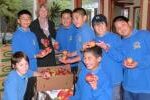Saving the bees means saving ourselves
“Europe’s decision to ban neonicotinoids was a good day for bees. We need to follow this lead and ban systemic pesticides that are killing our bees,” says Debbie Swanwick, Spokesperson, Soil & Health – Organic NZ.
In April 2013 Europe placed a two-year ban on three neonicotinoids – a systemic pesticide that permeates every cell of a plant and makes it poisonous. Birds, earthworms and other wildlife are thought to be affected too.
This class of pesticide is not limited to agricultural and farm use but is also found in many pesticide products used in the home and by pest professionals.
“Humanity is hugely dependent on bees for our food, and we poison them at our peril,” says Swanwick. “We urgently need to switch to sustainable, organic farming methods that are kind to bees, to us, and to the whole ecosystem.”
Bees pollinate 75% of food crops, and in New Zealand 430,000 hives contribute $5 billion to the economy from crop and clover production.
The United Nations Environment Program released a report in 2011 indicating a “sixth major extinction” of biological diversity is currently underway, caused by habitat loss, pollution, pest invasion, and disease, leading to ecosystem havoc.
“Bee populations are in decline worldwide. In the UK alone honeybee populations have halved in the past twenty five years. This could take us on a journey to a destination we never thought possible and one worthy of a Darwin award. The harsh reality is that humans may be responsible for our own extinction because we didn’t fight hard enough for our survival,” says Swanwick.
Consumers can avoid GE, pesticides and additives in their food by buying certified organic produce. In New Zealand that is labelled as BioGro, AsureQuality, OrganicFarmNZ and Demeter.
Soil & Health is one of the oldest organic organisations in the world and advocates for the consumer’s right to have fresh, healthy, organic food and water free of GE, pesticides and additives and their right to know what is in their food and water. Oranga nuku, oranga kai, oranga tangata. To learn more about what is really in your food subscribe to their Facebook Page and subscribe http://www.facebook.com/OrganicNZ
To view online click here www.organicnz.org.nz/node/623
References
(1) http://bbe-tech.com/bees/2012/04/03/know-your-neo-nicotinoids/
(2) http://www.the-scientist.com/?articles.view/articleNo/35355/title/Europe…
(3) http://www.unep.org/dewa/Portals/67/pdf/Global_Bee_Colony_Disorder_and_T…
(4) http://www.digitaljournal.com/article/304525
(6) http://www.telegraph.co.uk/earth/earthnews/9160366/Honeybee-decline-blam…


